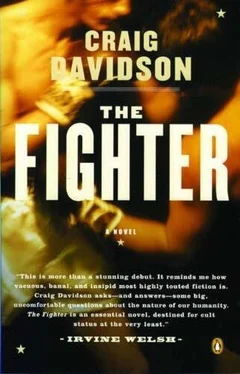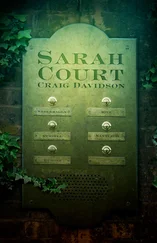Paul couldn’t help but wonder: if it ever came to it, would he be facedown in a bunker with a bullet in his skull? He’d never know, and that was the worst part — the wondering.
All he said was, “I’ve had it pretty cushy so far.”
Lou nodded.
“First time I saw you, I said give this guy a week. You had the look of a lot of guys your age — a lily. I don’t quite get the things you boys get up to.
Building superhero bodies at the gym and hurling yourselves off high rises with a parachute on your back.” Lou snorted. “John Wayne never lifted a barbell in his life. Put Jack La Lanne and the Duke in a cage and see who comes out alive.”
Lou worked Paul another round. Lordy, this kid could hit. His power reminded Lou of another fighter he’d trained, the young son of a carnival barker. Years back Lou had taken the kid down south of Rock Springs, where he’d fought in a dirt bowl at the base of the Rockies. July or early August and they’d fought like dogs, the barker’s kid and a lanky Mexie who’d ridden boxcars up from Ciudad Obregon. Between rounds the idiots in charge had laid down a sheen of lamp oil to keep the dust down. Maybe it had been the righteously burning sun or a cigar ember — this low whoomph, then greasy orange fire licking from the earth. The spectators backed away but inside the bowl the Mexie and the barker’s son kept swinging, their eyes bruised shut and blood coming out of them all places. Flames crawled up their arms in glittering sleeves but they kept punching as though the fight was the only thing keeping them alive or was the only thing worth dying for.
“Your generation’s got a lot to prove,” Lou said during the next break.
“Before, just staying alive was proof. My granddad with the Depression, then the war. My pops, Big Two. Me, Vietnam. And otherwise you were poor, which is a war of its own. You guys, though…”
Paul pounded the punch mitts. Lou winced.
“All I’m saying is, how can you ever know sweet until you’ve tasted the sour? How can any of you quite know you’re… men?”
Paul was irritated. He wanted to slip a fist past the punch mitts and crack Lou in the teeth but wasn’t sure he could fob it off as an accident.
“Go change up and meet me in the office.”

In the change room Paul doffed his sweaty top and stood before the mirror. The flesh of his chest was tight, pebbled, rough as pig leather. He’d gained an inch around his arms, two around his neck, and dropped two pant sizes. The steroids had done their job, but not without side effects. Paul’s shoulders were pocked with greasy cysts, his scalp ringed with acne. He also suffered a case of grape-cluster hemorrhoids; the bleeding had gotten so bad he found himself browsing the pharmacy’s adult diaper aisle.
In the office, Lou beckoned him to a chair that looked to be held together with surgical tape.
“Let me show you something.”
He set a framed print on the desktop. It was an etching of a muscular athlete approaching middle age. He had a thick beard, a flattened nose, and was balding around the crown of his skull. His breeches were held up by suspenders over his bare shoulders, which were rounded and enormous. He stood in the classic pugilist’s stance: right foot forward and turned slightly inward, hands staggered before his chin. Thunderbird Layne, the caption read, Itinerant Bareknuckler.
“Years ago, fighters traveled town to town like gunfighters,” said Lou. “A whole class of men lived this way; also card sharks and mariachis and snake-oil salesmen.
Drifters as far as most were concerned, crazed faces who came and went in the space of a single night. These fighters would stride into some town square, toe a line in the dirt, and challenge any man to cross it. If that town happened to be full of serious brawlers he might fight ten, twelve men — whole families, uncles and brothers and sons. If that town was wrathful it beat the fighter down and ran him out on a rail. And if that town was kind it gave him a warm bed and sent him on the next day.
“They fought for money, yeah, enough to get them down the road — but that wasn’t why they did it. Men like that, they were born for fighting, the way other men are born for the sciences or high finance. Alone on a dusty street, squared up against some burly native son with pissed-off townsfolk screaming for his scalp…” A dramatic sigh. “But then along came the Marquis de Queensberry with his rules of fair play and soon nobody remembered the drifting bareknucklers. I got nothing against boxing — a more noble sport you will not find — but those men were gladiators, or the closest we’ve seen since those times.”
Lou opened a drawer and pulled out a bottle of Bell’s whiskey and a pair of waterspotted glasses. He poured a respectable two ounces into each and handed one over.
“Guys like Thunderbird here,” he tapped the photo with his glass, “they’re still around.”
“I’ve never seen anyone like that.”
“Oh, you probably have. Just didn’t know it.” Paul thought of the boxer who’d come in that first day — the guy with his eggplant-colored head and anthill eyes — and remembered thinking no way could that damage have come from a legitimate boxing match. “There are places where you’ll find them, still…”
“You know any of those places?”
“Oh,” Lou said innocently, “so… you’re interested?”
Paul felt springs coiled under his skin waiting to lurch out. “Do me a favor, Lou, and don’t jerk me around.”
Lou’s face changed like still water brushed by a breeze. “I know a place, yeah. It’s illegal, obviously. Take you sometime, you want.”
“I’d like that.”
“We’ll see.” Lou leaned back in his chair. “Can’t promise anything.” He scribbled an address on the back of an unpaid hydro bill. “I noticed you’re a bleeder. One little biff and you’re gushing. That’s gonna hurt you in the ring.” He handed the address over. “The guy’s name is Sandercott. A lot of my guys see him.”

The address led to a housing project in the Western Hill district.
The house occupied the final lot on a treeless lane. Its faded paint was the color of boiled organ meat. A Datsun B-210 jacked up on blocks on the front lawn, windows smashed, interior gutted.
Paul’s knock was answered by a man in his late fifties. Balding and rotund, he wore a ratty housecoat cinched with a yellow extension cord.
Paul said, “Lou sent me.”
Sandercott said, “Nose or brows?”
Before Paul could answer Sandercott reached out and ran a nicotine-stained thumb over the curve of his eyebrow. “Brows look okay. So, by process of elimination, nose.”
The place stunk of deep-fryer fat. The carpet was so threadbare the nylon underweave showed through in spots. Paul had seen houses like this only in movies, desperately grim movies where unfit mothers nodded on heroin while their urchins splashed in the scummy gray water of a Mister Turtle pool.
“Head on into the shitter,” Sandercott said.
The bathroom was bright and not particularly clean. A framed needlepoint slogan over the toilet read if you sprinkle when you tinkle, be asweetie, wipe the seatie. Sandercott came in with a Piano tacklebox. When he opened it on the sink’s edge, Paul saw that each compartment was stocked with gauze and iodine and burn salve.
“What are you planning on?”
“Lou didn’t tell you? Typical.” Sandercott motioned to the toilet.
“Siddown.”
He showed Paul a slender brushed-aluminum tool. It looked like the soldering rod that’d come with Paul’s Unger Industrial wood-burning kit.
Читать дальше













